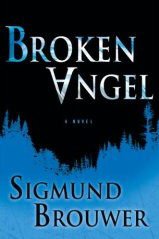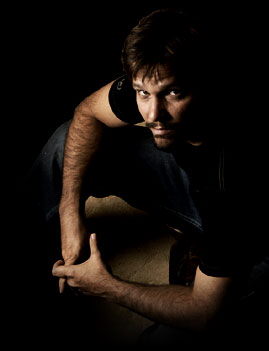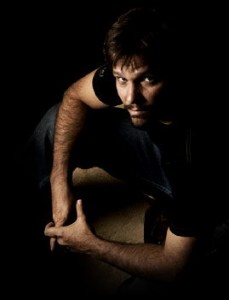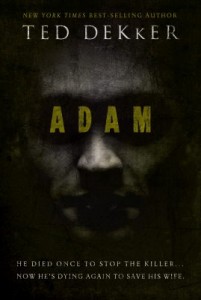by Jason Joyner | May 29, 2008 | Blog, Mass Effect, reading, reviews, sci-fi
After finishing two books last week required for blog tours, I chilled this weekend with a book of my own choosing (well, I also choose the ones I review, but yanno, I mean no deadline here).
One of my hobbies is playing video games. I got an Xbox 360 last year for my birthday, mainly so I could play Mass Effect, the latest role-playing game from powerhouse developer Bioware when it released last November. I got the game the day it came out (I know, sad), and played through it over the holidays. I wasn’t disappointed. The gameplay was unique, the story and characters were engrossing, and it was one of the best video game experiences I’ve had. The game earns its “M” for Mature rating, and a little of the content is disappointing, but overall I really got into the original sci-fi universe that Bioware created.
I wasn’t sure what to expect when I picked up Mass Effect: Revelation. The book is written by Drew Karpyshyn, lead writer for the game and also for my favorite all-time game, Star Wars: Knights of the Old Republic (lets hear it for KotOR!). He has also written other sci-fi novels, including Star Wars spin-offs, so he has novel writing experience. I mentioned above that the writing for the game Mass Effect was excellent.
I found out that getting a novel based off a video game is…what it is. The book starts 20 years prior to the game. Humanity is a new race to the galactic population. An ancient race called the Protheans have left technology scattered across the galaxy, allowing interstellar transport. Humans find buried ruins on Mars, then realize that the Plutonian moon Charon is actually a dormant mass effect relay, allowing us to join the star-faring races.
This isn’t Star Trek however, where Earthlings are the main force. Humanity is a new player, catching up with other established races like the turians and asaris, and sometimes acting like the little kid at the table scrambling to be heard. It makes for an interesting take on a sci-fi setting.
The book covers a mission from Lt. David Anderson, a secondary character in the game. He is charged with finding a missing scientist who suspiciously went missing prior to her whole research unit being wiped out. Anderson must contend with Saren, a turian Spectre (elite agent of the galactic Council) who is hostile toward humanity and concerned with his own agenda, and the krogran mercenary Skaar. When Anderson gets a chance to show humanity’s potential by being considered for the Spectres, will he succeed in proving humanity’s ability, or will he fall against his alien contenders?
The book will appeal to fans of the game only. The author does a fine job explaining the universe, but I don’t know that it could stand on its own. I enjoyed as far as it re-immersed me into the Mass Effect universe, but overall it is only a mediocre read. The characterization is flat throughout, and the writing comes across as fairly stock, cliche sci-fi. The pacing is good, and it is a quick, easy read. If someone really wants to dive more into the ME universe, it is not an expensive purchase. However, I think the big climax was more succinctly explained with more tension in 5 minutes of game conversation rather than in the book. It also seems to set up the story of the game too perfectly – I would’ve preferred to see less of a blatant set-up for the game.
That’s my out of left field review for the week. If you have a 360, don’t miss out on Mass Effect. The novel, on the other hand, is optional.

by Jason Joyner | May 23, 2008 | Blog, CFBA, fiction, reading, reviews, speculative fiction
 This was a busy week for me with blog tours. Two Christian Fiction Blog Alliance reviews and the Christian Sci/Fi Fantasy tour highlighting Mindflights webzine. Phew.
This was a busy week for me with blog tours. Two Christian Fiction Blog Alliance reviews and the Christian Sci/Fi Fantasy tour highlighting Mindflights webzine. Phew.
Today the CFBA tour features Broken Angel, the latest book from author Sigmund Brouwer. He is the author of eighteen best-selling novels for children and adults. His last book was Fuse of Armageddon and his novel The Last Disciple was featured in Time magazine and on ABC’s Good Morning America. A champion of literacy, he teaches writing workshops for students in schools from the Arctic Circle to inner city Los Angeles. Sigmund is married to Christian recording artist Cindy Morgan, and they and their two daughters divide their time between homes in Red Deer, Alberta, Canada and Nashville, Tennessee.
Broken Angel has a very intriguing premise. In the near future there are two nations carved from the United States: Appalachia, where religious people resettled en masse to live in a “godly” land, led by the enigmatic Bar Elohim, and the “Outside”, a land that the Appalachians fled to live according to their beliefs. Appalachia is strictly controlled. Even though most people appear happy and satisfied, the occasional but inevitable malcontents pay their debt to society by working in the factories. The truly wicked are stoned to death. Some try to escape to the Outside, but they have to face the mysterious Clan, rumored to kill any who enter their territory and the enemy of Bar Elohim.
Caitlyn is a 15 year old girl carrying a terrible burden in her disfigured body. Hiding in the cover of Appalachia, she lives with her father quietly until the day that they are forced to run for their lives. When her father is taken from her before he can fully reveal painful secrets, she must use all she’s been taught to survive bounty hunters, the wilderness, and the Clan.
Broken Angel is a book of strengths and weaknesses. The various characters are memorable and stand out from each other. Brouwer creates an insanely fast paced thriller. It is not a long book, and there is hardly a moment to relax, as each character faces trials and trouble in trying to accomplish their goals – from the expert bounty hunter tracking Caitlyn, to the Sheriff and the agent from Outside trailing both of them.
Unfortunately, the book suffers at times from the fast pace. Characters are introduced fast and furious initially, making it hard to keep them straight. The futuristic scenario is interesting but thinly developed. The premise has a lot of potential, but it is skimmed with the pace and shortness of the book.
Overall, it is an easy, entertaining read. I haven’t read any of Brouwer’s books before, and he is definitely talented. I wonder if the scope of the story was hampered due to size restraints. I liked the book, but I’m left wanting more. However, if you are looking for a fast-paced escapist summer read, this book would fit the bill.
If you would like to read the first chapter, go HERE.

by Jason Joyner | May 23, 2008 | Blog, CFBA, fiction, reading, reviews, speculative fiction
 This was a busy week for me with blog tours. Two Christian Fiction Blog Alliance reviews and the Christian Sci/Fi Fantasy tour highlighting Mindflights webzine. Phew.
This was a busy week for me with blog tours. Two Christian Fiction Blog Alliance reviews and the Christian Sci/Fi Fantasy tour highlighting Mindflights webzine. Phew.
Today the CFBA tour features Broken Angel, the latest book from author Sigmund Brouwer. He is the author of eighteen best-selling novels for children and adults. His last book was Fuse of Armageddon and his novel The Last Disciple was featured in Time magazine and on ABC’s Good Morning America. A champion of literacy, he teaches writing workshops for students in schools from the Arctic Circle to inner city Los Angeles. Sigmund is married to Christian recording artist Cindy Morgan, and they and their two daughters divide their time between homes in Red Deer, Alberta, Canada and Nashville, Tennessee.
Broken Angel has a very intriguing premise. In the near future there are two nations carved from the United States: Appalachia, where religious people resettled en masse to live in a “godly” land, led by the enigmatic Bar Elohim, and the “Outside”, a land that the Appalachians fled to live according to their beliefs. Appalachia is strictly controlled. Even though most people appear happy and satisfied, the occasional but inevitable malcontents pay their debt to society by working in the factories. The truly wicked are stoned to death. Some try to escape to the Outside, but they have to face the mysterious Clan, rumored to kill any who enter their territory and the enemy of Bar Elohim.
Caitlyn is a 15 year old girl carrying a terrible burden in her disfigured body. Hiding in the cover of Appalachia, she lives with her father quietly until the day that they are forced to run for their lives. When her father is taken from her before he can fully reveal painful secrets, she must use all she’s been taught to survive bounty hunters, the wilderness, and the Clan.
Broken Angel is a book of strengths and weaknesses. The various characters are memorable and stand out from each other. Brouwer creates an insanely fast paced thriller. It is not a long book, and there is hardly a moment to relax, as each character faces trials and trouble in trying to accomplish their goals – from the expert bounty hunter tracking Caitlyn, to the Sheriff and the agent from Outside trailing both of them.
Unfortunately, the book suffers at times from the fast pace. Characters are introduced fast and furious initially, making it hard to keep them straight. The futuristic scenario is interesting but thinly developed. The premise has a lot of potential, but it is skimmed with the pace and shortness of the book.
Overall, it is an easy, entertaining read. I haven’t read any of Brouwer’s books before, and he is definitely talented. I wonder if the scope of the story was hampered due to size restraints. I liked the book, but I’m left wanting more. However, if you are looking for a fast-paced escapist summer read, this book would fit the bill.
If you would like to read the first chapter, go HERE.
by Jason Joyner | Apr 21, 2008 | Bible, Blog, conspiracy, CSFF, reading, reviews, speculative fiction
Some of the best loved passages in the whole Bible come from the correspondence of the apostle Paul to the Corinthian church. The letters of 1 and 2 Corinthians teach on a number of issues and give insight that no other books in the New Testament have.
Interestingly, Paul had a greater conversation with the Corinthian church than what many people realize on the surface.
He first came to Corinth on his second missionary journey, after being chased out of other Grecian centers such as Thessalonica, Berea, and Athens. He met up with Priscilla and Aquila, fellow Jewish Christians and tentmakers. He stayed and worked with them, proclaiming the gospel in the famously immoral city. The record in Acts states he stayed there for “some time”, and then left to hit Ephesus on the way back to Antioch in Syria.
Paul hit the road almost immediately after his return, encouraging churches in Galatia before coming back to Ephesus, where he stayed for three years. It was during this time that scholars believe he wrote his letters to the Corinthian church. We have two letters included in the Bible, 1 and 2 Corinthians.
There are…more.
In 1 Corinthians 5:9-11 it refers to a prior letter that Paul wrote to the church, before 1 Corinthians. Apparantly he had written to them about issues regarding sexual immorality and he clarifies his position in the current letter. He gives much teaching in what we know as 1 Corinthians, and it seems to have been received poorly. When we move into 2 Corinthians, Paul references a “painful visit” in chapter 2 verse 1. It is thought that the letter of 1 Corinthians was not well received, and Paul made a visit to bring correction. After he left, he wrote yet another letter to the Corinthians, which seems to finally have the effect that he wanted, causing “sorrow that led…to repentence” (2 Cor 7:8-9, see also 10:9-11). Thus, the relationship between the teacher and the church is restored, and Paul can write a more joyful letter that becomes our 2 Corinthians.
This begs the question: what happened to the “other” Corinthian letters. By this count, there were at least four letters of Paul to the Corinthians. The two other letters I have mentioned have no other reference in Scripture, and no known copy or fragment exists. In early lists of approved New Testament books, there is no mention of other Corinthian letters. We have no idea, other than the two quick references listed above, what the other books contained.
I have heard people who criticize the Bible’s accuracy claim that the lack of 4 Corinthian letters shows the Bible wasn’t accurately preserved. To this I say hogwash. Just because it is mentioned in the Bible doesn’t mean that it was meant to be in the Bible. Paul quotes a pagan philosopher, should the pagan’s works be in the Bible? I believe that what we needed was preserved, and these other Corinthian letters were of such a personal nature that they weren’t pertinent to be kept in a global/general teaching manual like the Bible.
But…what if one of the “lost” letters to the Corinthians was found? What if it held explosive teaching and prophecy, threatening the status quo and becoming the centerpiece of a battle between good and evil?
What if?
Check back tomorrow for more…
Brandon Barr
Jim Black
Justin Boyer
Jackie Castle
Karri Compton
CSFF Blog Tour
Gene Curtis
D. G. D. Davidson
Jeff Draper
April Erwin
Karina Fabian
Beth Goddard
Marcus Goodyear
Todd Michael Greene
Michael Heald
Christopher Hopper
Joleen Howell
Kait
Carol Keen
Mike Lynch
Terri Main
Margaret
Melissa Meeks
Pamela Morrisson
John W. Otte
Rachelle
Steve Rice
Ashley Rutherford
Chawna Schroeder
James Somers
Rachelle Sperling
Stuart Stockton
Steve Trower
Speculative Faith
Robert Treskillard
Laura Williams
Timothy Wise
by Jason Joyner | Apr 21, 2008 | Bible, Blog, conspiracy, CSFF, reading, reviews, speculative fiction
Some of the best loved passages in the whole Bible come from the correspondence of the apostle Paul to the Corinthian church. The letters of 1 and 2 Corinthians teach on a number of issues and give insight that no other books in the New Testament have.
Interestingly, Paul had a greater conversation with the Corinthian church than what many people realize on the surface.
He first came to Corinth on his second missionary journey, after being chased out of other Grecian centers such as Thessalonica, Berea, and Athens. He met up with Priscilla and Aquila, fellow Jewish Christians and tentmakers. He stayed and worked with them, proclaiming the gospel in the famously immoral city. The record in Acts states he stayed there for “some time”, and then left to hit Ephesus on the way back to Antioch in Syria.
Paul hit the road almost immediately after his return, encouraging churches in Galatia before coming back to Ephesus, where he stayed for three years. It was during this time that scholars believe he wrote his letters to the Corinthian church. We have two letters included in the Bible, 1 and 2 Corinthians.
There are…more.
In 1 Corinthians 5:9-11 it refers to a prior letter that Paul wrote to the church, before 1 Corinthians. Apparantly he had written to them about issues regarding sexual immorality and he clarifies his position in the current letter. He gives much teaching in what we know as 1 Corinthians, and it seems to have been received poorly. When we move into 2 Corinthians, Paul references a “painful visit” in chapter 2 verse 1. It is thought that the letter of 1 Corinthians was not well received, and Paul made a visit to bring correction. After he left, he wrote yet another letter to the Corinthians, which seems to finally have the effect that he wanted, causing “sorrow that led…to repentence” (2 Cor 7:8-9, see also 10:9-11). Thus, the relationship between the teacher and the church is restored, and Paul can write a more joyful letter that becomes our 2 Corinthians.
This begs the question: what happened to the “other” Corinthian letters. By this count, there were at least four letters of Paul to the Corinthians. The two other letters I have mentioned have no other reference in Scripture, and no known copy or fragment exists. In early lists of approved New Testament books, there is no mention of other Corinthian letters. We have no idea, other than the two quick references listed above, what the other books contained.
I have heard people who criticize the Bible’s accuracy claim that the lack of 4 Corinthian letters shows the Bible wasn’t accurately preserved. To this I say hogwash. Just because it is mentioned in the Bible doesn’t mean that it was meant to be in the Bible. Paul quotes a pagan philosopher, should the pagan’s works be in the Bible? I believe that what we needed was preserved, and these other Corinthian letters were of such a personal nature that they weren’t pertinent to be kept in a global/general teaching manual like the Bible.
But…what if one of the “lost” letters to the Corinthians was found? What if it held explosive teaching and prophecy, threatening the status quo and becoming the centerpiece of a battle between good and evil?
What if?
Check back tomorrow for more…
Brandon Barr
Jim Black
Justin Boyer
Jackie Castle
Karri Compton
CSFF Blog Tour
Gene Curtis
D. G. D. Davidson
Jeff Draper
April Erwin
Karina Fabian
Beth Goddard
Marcus Goodyear
Todd Michael Greene
Michael Heald
Christopher Hopper
Joleen Howell
Kait
Carol Keen
Mike Lynch
Terri Main
Margaret
Melissa Meeks
Pamela Morrisson
John W. Otte
Rachelle
Steve Rice
Ashley Rutherford
Chawna Schroeder
James Somers
Rachelle Sperling
Stuart Stockton
Steve Trower
Speculative Faith
Robert Treskillard
Laura Williams
Timothy Wise

by Jason Joyner | Feb 23, 2008 | Blog, CFBA, fiction, reading, reviews, suspense
 Ted Dekker doesn’t need much introduction in the realm of Christian fiction. If any readers here think that a book from Christian fiction authors aren’t worth checking out, then his new book Adam is very likely to change your mind.
Ted Dekker doesn’t need much introduction in the realm of Christian fiction. If any readers here think that a book from Christian fiction authors aren’t worth checking out, then his new book Adam is very likely to change your mind.
I’ve enjoyed the other books of his that I’ve read (Blink, Thr3e, and Showdown). I have been busy enough with reading that I’ve haven’t managed to read every one of his books. He has a powerful imagination and loves to explore the tension between good and evil.
Adam is the latest book to examine this theme. From the back cover:
FBI behavioral psychologist Daniel Clark has become famous for his well-articulated arguments that religion is one of society’s greatest antagonists. What Daniel doesn’t know is that his obsessive pursuit of a serial killer known only as “Eve” is about to end abruptly with an unexpected death-his own.
Twenty minutes later Daniel is resuscitated, only to be haunted by the loss of memory of the events immediately preceding his death.
Daniel becomes convinced that the only way to stop Eve is to recover those missing minutes during which he alone saw the killer’s face. And the only way to access them is to trigger his brain’s memory dump that occurs at the time of death by simulating his death again…and again. So begins a carefully researched psychological thriller which delves deep into the haunting realities of near-death experiences, demon possession, and the human psyche.
 I’m not a person who reads a book in one sitting, but I really wish I could have with Adam. He knows how to capture an audience and hold them to their seats, knuckles white from gripping the book. The main characters all suffer from some obsession, and the individual reactions to the scenario are intriguing. As they work together to hunt down the serial killer “Eve”, the tension ratchets up to a surprising turn of events that throws the book from being a taut thriller about tracking a murderer to something much more haunting and personal.
I’m not a person who reads a book in one sitting, but I really wish I could have with Adam. He knows how to capture an audience and hold them to their seats, knuckles white from gripping the book. The main characters all suffer from some obsession, and the individual reactions to the scenario are intriguing. As they work together to hunt down the serial killer “Eve”, the tension ratchets up to a surprising turn of events that throws the book from being a taut thriller about tracking a murderer to something much more haunting and personal.
Dekker’s writing is fast-paced, and there is not a lot of flowery exposition – he hits the action hard and keeps the plot moving. He uses an interesting technique in this book. There is a fictional Crime Today magazine serial of 9 articles discussing how a serial murderer comes to be. Basically he gives away who the bad guy is from the get go, but is still able to keep the suspense at high levels in tracking the path throughout the serial articles and the narrative. Very challenging to pull off, yet he does it very well.
My only critiques lie with the medical aspects, which play into the plot prominently. He has done his research well, and it is all written well and believably. My problem is that I am a physician assistant, so I can see a few minor inaccuracies. Aren’t I picky? I’m sure that it won’t be a problem for any other readers.
Overall, this book has reminded me of why Ted Dekker is the premier Christian suspense author today. He deftly handles issues of darkness and light and is a master of drawing his reader into the the battle that ensues. I highly recommend this book, and I’ve got a new itch to read more of Dekker’s work.



